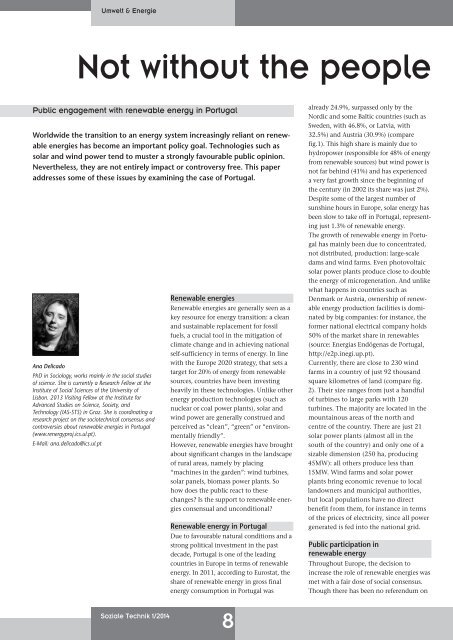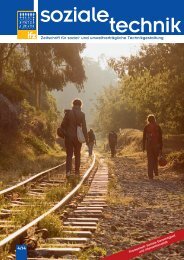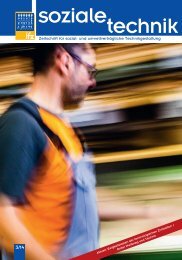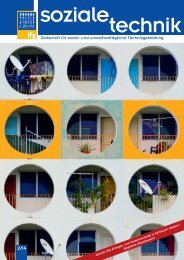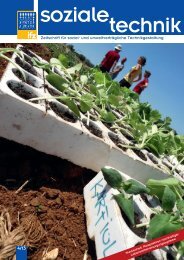SOZIALE TECHNIK 1/14
SOZIALE TECHNIK ist die einzige Zeitschrift im deutschsprachigen Raum, die über umwelt- und sozialwissenschaftliche Technikforschung berichtet. Die Themen umfassen Technologie & Politik, Umwelt & Energie, Neue Biotechnologien und Frauen & Technik. SOZIALE TECHNIK informiert seit mehr als 20 Jahren über aktuelle Themen in den Bereichen umwelt- und sozialverträgliche Technikgestaltung, Technikbewertung und Technikfolgenabschätzung.
SOZIALE TECHNIK ist die einzige Zeitschrift im deutschsprachigen Raum, die über umwelt- und sozialwissenschaftliche Technikforschung berichtet. Die Themen umfassen Technologie & Politik, Umwelt & Energie, Neue Biotechnologien und Frauen & Technik.
SOZIALE TECHNIK informiert seit mehr als 20 Jahren über aktuelle Themen in den Bereichen umwelt- und sozialverträgliche Technikgestaltung, Technikbewertung und Technikfolgenabschätzung.
Erfolgreiche ePaper selbst erstellen
Machen Sie aus Ihren PDF Publikationen ein blätterbares Flipbook mit unserer einzigartigen Google optimierten e-Paper Software.
Umwelt & Energie<br />
Not without the people<br />
Public engagement with renewable energy in Portugal<br />
Worldwide the transition to an energy system increasingly reliant on renewable<br />
energies has become an important policy goal. Technologies such as<br />
solar and wind power tend to muster a strongly favourable public opinion.<br />
Nevertheless, they are not entirely impact or controversy free. This paper<br />
addresses some of these issues by examining the case of Portugal.<br />
Ana Delicado<br />
PhD in Sociology, works mainly in the social studies<br />
of science. She is currently a Research Fellow at the<br />
Institute of Social Sciences of the University of<br />
Lisbon. 2013 Visiting Fellow at the Institute for<br />
Advanced Studies on Science, Society, and<br />
Technology (IAS-STS) in Graz. She is coordinating a<br />
research project on the sociotechnical consensus and<br />
controversies about renewable energies in Portugal<br />
(www.renergyproj.ics.ul.pt).<br />
E-Mail: ana.delicado@ics.ul.pt<br />
Renewable energies<br />
Renewable energies are generally seen as a<br />
key resource for energy transition: a clean<br />
and sustainable replacement for fossil<br />
fuels, a crucial tool in the mitigation of<br />
climate change and in achieving national<br />
self-sufficiency in terms of energy. In line<br />
with the Europe 2020 strategy, that sets a<br />
target for 20% of energy from renewable<br />
sources, countries have been investing<br />
heavily in these technologies. Unlike other<br />
energy production technologies (such as<br />
nuclear or coal power plants), solar and<br />
wind power are generally construed and<br />
perceived as “clean”, “green” or “environmentally<br />
friendly”.<br />
However, renewable energies have brought<br />
about significant changes in the landscape<br />
of rural areas, namely by placing<br />
“machines in the garden”: wind turbines,<br />
solar panels, biomass power plants. So<br />
how does the public react to these<br />
changes? Is the support to renewable energies<br />
consensual and unconditional?<br />
Renewable energy in Portugal<br />
Due to favourable natural conditions and a<br />
strong political investment in the past<br />
decade, Portugal is one of the leading<br />
countries in Europe in terms of renewable<br />
energy. In 2011, according to Eurostat, the<br />
share of renewable energy in gross final<br />
energy consumption in Portugal was<br />
already 24.9%, surpassed only by the<br />
Nordic and some Baltic countries (such as<br />
Sweden, with 46.8%, or Latvia, with<br />
32.5%) and Austria (30.9%) (compare<br />
fig.1). This high share is mainly due to<br />
hydropower (responsible for 48% of energy<br />
from renewable sources) but wind power is<br />
not far behind (41%) and has experienced<br />
a very fast growth since the beginning of<br />
the century (in 2002 its share was just 2%).<br />
Despite some of the largest number of<br />
sunshine hours in Europe, solar energy has<br />
been slow to take off in Portugal, representing<br />
just 1.3% of renewable energy.<br />
The growth of renewable energy in Portugal<br />
has mainly been due to concentrated,<br />
not distributed, production: large-scale<br />
dams and wind farms. Even photovoltaic<br />
solar power plants produce close to double<br />
the energy of microgeneration. And unlike<br />
what happens in countries such as<br />
Denmark or Austria, ownership of renewable<br />
energy production facilities is dominated<br />
by big companies: for instance, the<br />
former national electrical company holds<br />
50% of the market share in renewables<br />
(source: Energias Endógenas de Portugal,<br />
http://e2p.inegi.up.pt).<br />
Currently, there are close to 230 wind<br />
farms in a country of just 92 thousand<br />
square kilometres of land (compare fig.<br />
2). Their size ranges from just a handful<br />
of turbines to large parks with 120<br />
turbines. The majority are located in the<br />
mountainous areas of the north and<br />
centre of the country. There are just 21<br />
solar power plants (almost all in the<br />
south of the country) and only one of a<br />
sizable dimension (250 ha, producing<br />
45MW): all others produce less than<br />
15MW. Wind farms and solar power<br />
plants bring economic revenue to local<br />
landowners and municipal authorities,<br />
but local populations have no direct<br />
benefit from them, for instance in terms<br />
of the prices of electricity, since all power<br />
generated is fed into the national grid.<br />
Public participation in<br />
renewable energy<br />
Throughout Europe, the decision to<br />
increase the role of renewable energies was<br />
met with a fair dose of social consensus.<br />
Though there has been no referendum on<br />
Soziale Technik 1/20<strong>14</strong><br />
8


